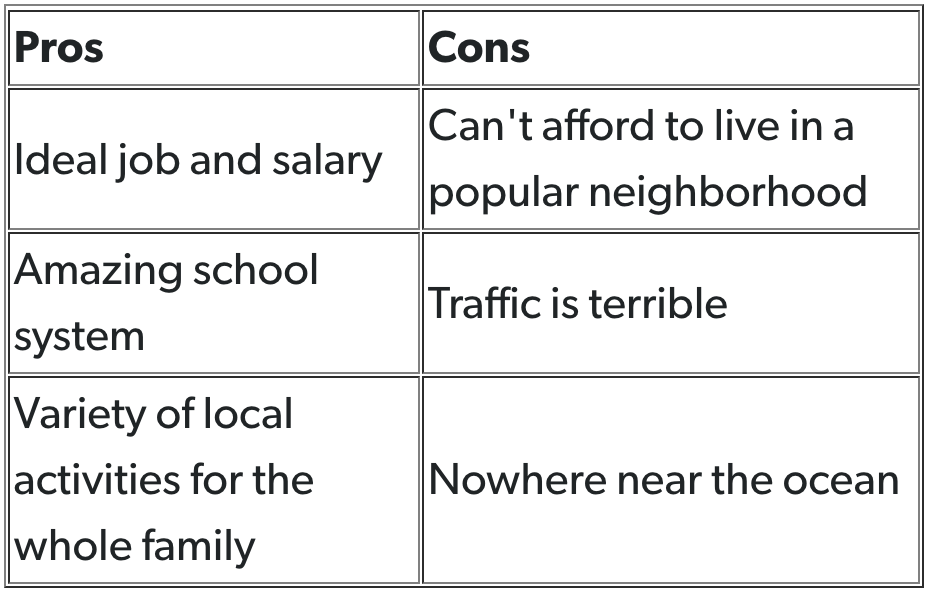
Decide Where to Move
Okay, the first task on your relocation journey is to make a smart choice on where to live. Most of you probably already know where you’re going to move—and if so, you can skip this part. But if you’re still searching for the perfect city to capture your heart, or want advice pinning down the right neighborhood, here are some things to consider.
First, Can I Afford to Live There?
If you know anything about us folks here at Ramsey, you already know the first thing we’re going to talk about: your budget. Before you get dead set on moving to one place in particular, it’s smart to give yourself some time to figure out if you can afford to live there, or what the quality of life will be like when you get there.
A good first step is to use a cost of living calculator to look at places where you want to live. Then compare your budget to key economic factors like:
- Median household income. Let’s say the location you’re interested in has a median household income of $60,000. That means half of the residents make more than $60,000 and half of them make less than that. If the median is far beyond what you currently earn, living there might be financially uncomfortable—unless you change your budget or salary, which is definitely an option! (More on that later).
- Housing. This is a big one. Whether you’re renting or buying a house, it’ll be hard to balance other financial goals if your monthly housing costs (rent or mortgage) are any greater than 25% of your monthly take-home pay. If you buy a home, this includes property taxes, insurances, and homeowners association (HOA) fees. If you’re having trouble staying below 25% of your take-home pay, consider finding a roommate or moving farther from downtown—do whatever you have to do to make an affordable housing decision.
- Transportation. Check your current budget to see how much you spend on gas or public transportation each month. Compare that with the average cost for transportation in your new city. You don’t want higher transportation costs to sneak up on you and bust your budget! On the bright side, you might be surprised by how much money you could save if your new city has good public transportation. But if these costs turn out to be higher, try to find housing in an area with a shorter commute.
- Food. Okay, depending on where you are and what you eat, yes, you might actually see a difference in the cost of food. For example, if you’re moving to another state, food might be taxed differently enough to cause a noticeable change in your budget.
- Health care. Health-care costs, like trips to the doctor or dentist, can be different from state to state—not to mention health insurance premiums. But keep in mind, your age and lifestyle habits will have a bigger influence on your health insurance premium than where you live.
- Entertainment. Make sure you check out the cost of things you’d like to do for fun in the areas you’re considering. You might find that seeing chick flicks, throwing tailgate parties, headbanging at heavy metal concerts, tanning at water parks, or getting fit at the gym come with a different price tag in your new location.
- Childcare. If you have kiddos, the potential shift in cost for a caregiver or daycare center in your new location might affect your budget. This shouldn’t be a problem if you or your spouse is a stay-at-home parent or you’re moving closer to grandma and grandpa or other family members who can give you a hand.
- Taxes. Okay, this is another big one if you’re moving out of state. Some states charge significantly higher taxes than others. This might be nice if you’re moving somewhere that has a lower state income tax than your current one. But it probably won’t feel as nice the other way around. If that’s the case, no worries. You just need to prepare for it in your budget.
What to Do If You Can’t Afford the Cost of Living
Now, if the area you want to move to has a higher cost of living than you can currently afford, not all hope is lost. It just means you’ll need to be willing to adjust your standard of living, try to bump up your salary when you find a new job, or move to a zip code with a lower cost of living that isn’t far off from where you really want to live.
Second, Can I Enjoy Living There?
Alright, let’s say you’ve identified several locations that fit your budget. Now narrow those down by finding out if you (and your family) will be happy living there. Every family has different wants and needs. So, gather up the household for a fireside chat. Ask everyone to share what they like most about your current location.
Maybe one of your kids wants to be the next greatest college football star or on a stage pulling rabbits out of a hat. Maybe your spouse wants a sprawling garden to finally unleash a long-restrained gnome obsession. Is one area “rural enough” to fit an army of gnomes, while the other choices are more urban? Would you rather live in a place full of popular landmarks and tourist attractions, or a quiet little town surrounded by mountains and rivers?
Here are some other questions to ask:
- Are there enough social opportunities?
- Is there a healthy job market?
- Do the schools have high success rates?
- Does the area have a low crime rate?
- Can you handle the climate adjustment?
- Will trips to visit family become too expensive?
Last, What’s Most Important to Me?
You might feel torn between the pros and cons of the locations you’re looking at. To make a final decision, you’ll have to choose what’s most important to you. Maybe one location is closer to the job you want, while the other one has better schools. Or maybe one location has a cheaper cost of living, while the other one is near a beach. You’ll probably have to sacrifice something you want with whatever location you choose. But don’t worry—the right spot will make it all worthwhile!
Write out a list of pros and cons for each of your location candidates. Then you can clearly see what you like and don’t like about each one. Your list might look something like this:

Are there enough pros to outweigh the cons? If the cons don’t have any silver linings, it’s time to cross that location off your list. Whichever location makes the cut is your winner! We know all of this is easier said than done. So, try to imagine you’re already living in your new city and someone asks you why you moved. What did you answer? That answer might be just what you need to make your final decision.


